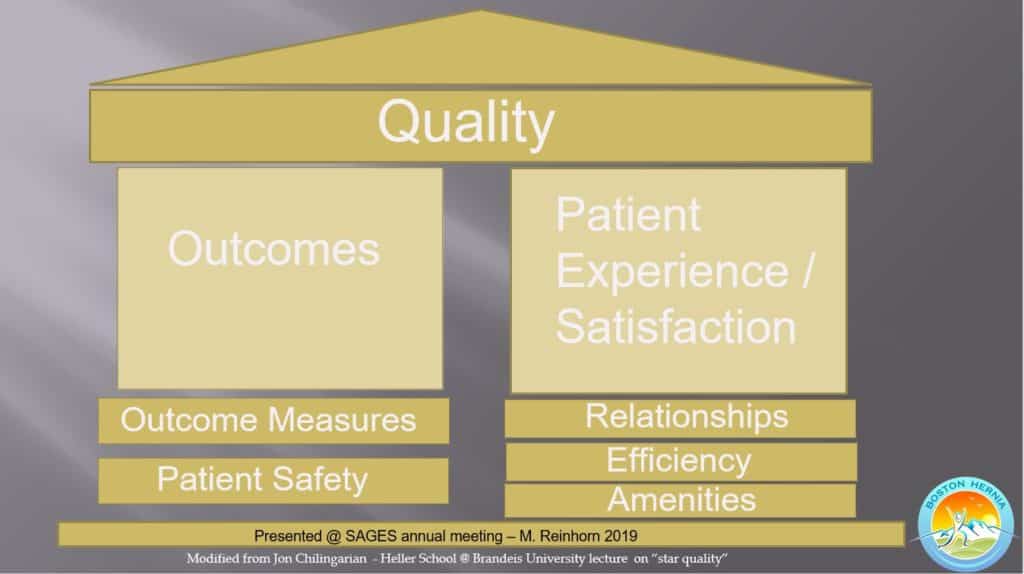How do we define quality?
Many surgeons feel that traditional hernia outcomes, such as recurrence and infection rate, are how we define quality in hernia surgery. At Boston Hernia, we feel that the quality of hernia care can be defined by several factors listed below that are more patient centered. While we cannot overlook the importance of outcomes like recurrence and infection rates, we feel that is just the starting point. The outcomes listed below are derived, in part, from the teachings of Professor Chilingerian, the program director of the MBA program Dr. Reinhorn attended. If you feel there are additional factors, we would love to hear from you.
Patient reported hernia outcomes:
- We track our patients’ quality of life before and after hernia surgery
- We actively participate in the Abdominal Core Health Quality Collaborative, a national hernia registry that is used to improve hernia surgery quality in North America.
- Dr. Reinhorn leads the opioid reduction task force, an effort to reduce surgeon prescribing of postoperative opioids.
- This database helps us to identify areas of improvement and to keep track of individual patients.
Patient satisfaction:
- Many of our patients are very satisfied and our Net Promoter Score is over 80%.
- Our testimonials page has information about what recent patients think of their experience with our practice.
- We know we can always do better, so please contact us if you have suggestions of how we can improve.
Efficiency in our clinical decision making:
- Our expertise typically allows us to make a diagnosis by history and physical exam.
- We rarely order imaging or other expensive tests.
- By focusing on only a few conditions, we are able to provide efficient, high quality, cost effective care.
Relationships and support:
- By working in a team of MD and PA, each patient has two dedicated providers.
- We aim to spend enough time with our patients in the office before surgery to provide education and support.
- We hope to earn the trust of each patient throughout the process.
Amenities:
- We hope our facilities are clean and professional and our staff is friendly and helpful.
- We try to see patients on schedule, to avoid long waiting times.
- Parking is easy, close to the office, and free.
Our Annual Quality Reports:
Surgical Volumes:
2022 volumes
Dr. Fullington – 496 hernias
Dr. Reinhorn – 463 hernias
2021 volumes
Dr. Fullington – 313 hernias (from May to Dec 2021)
Dr. Reinhorn – 527 hernias
Total number of hernia repairs at Boston Hernia in 2021 and 2022 = 1,844
Prior to 2021 – 4,401 hernias
Inguinal Hernia Quality Outcomes
We completed a study in 2017 that looked at short term post-operative hernia outcomes that were important to our inguinal hernia patients. We learned the following:
– 60% of patients did not use opioids (narcotics) for post operative pain
– Of those that did take narcotics, 66% used 4 pills or less
– 0 patients were still taking narcotic pain medication by the time of post-op appointment
– 92% of patients reported at post-op appointment that pain had little to no effect on daily life
– Almost 40% of patients missed 0 days of work after surgery
In August 2017, we published a paper, about hernia outcomes, based on our study that focuses on decreasing opioid prescribing after hernia surgery. Check it out here.
We joined the Abdominal Core Health Quality Collaborative in order to provide our patients with the highest quality care. This initiatives looks at hernia outcomes for a variety of hernia procedures. Please click on the logo below to learn more about it.
Approximate Cost Data*:
Total approximate costs of a single side primary hernia surgery in a healthy patient: $6,975-$15,000. This includes the following:
*These numbers are approximations of various insurance payments to the facility and providers for healthy patients without any additional medical problems undergoing a single, uncomplicated inguinal hernia. These numbers are only estimates. The cost to an individual patient depends on your insurance plan, the type of hernia(s), medical history, and various other factors.
For self pay patients, once we evaluate you, we will try to come up with the highest quality, most cost effective solution. During your initial consultation, the providers will address your needs and be able to provide you with a more exact quote for surgery. Our self pay fee for a new patient appointment is $350.
We are now providing select patients with an all inclusive hernia bundle price. This includes the preoperative evaluation, surgeon fee, assistant fee, anesthesia fee and facility fee.


